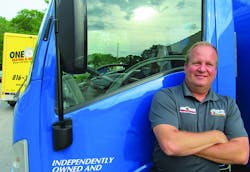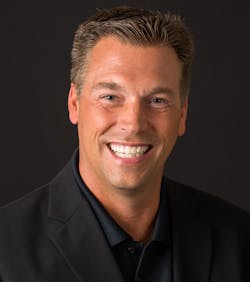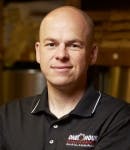He says the conversion process is helped along by telling prospects that they will always be full owners of their businesses. “We’re not interested in owning it,” Latuff says.
The franchise conversion process involves gaining the acceptance of three groups that are related to the existing business: owners, employees, and customers. “It’s just human nature to fear change,” Latuff says. “They think that we’re going to come in and change all of the rules, and that’s just not true. That’s why we craft a message for owners, employees and customers. We describe to inquiring owners what we do, why we’re doing it, and what’s in it for them, so they can see the bigger picture. We try to alleviate their fear of losing identity by helping them see that long-established customers don’t mind what you call the business, as long as it’s you who answers the phone, a familiar voice.”The second group to reach are the employees: dispatchers, managers, field technicians, installers and sales-people. The message here is one of a beneficial collaboration that will not change what makes the company special.“We share that, though we’re changing the name a little bit, culturally nothing else changes,” Latuff says. “They have a culture in place, which is one of the reasons why we’re partnering with them. We’re interested in enhancing the culture, so they can become part of a much bigger ‘family.’ Now, a 10-person company becomes part of a network of 4,000 or 5,000 people. They can share ideas, learn from each other and compare best practices.They can see that they’re part of something very special and much bigger than themselves, but that we’re not taking anything away from them. We’re just giving them more,” Latuff explains.“Now eight years into it we know the systems, we know the processes. It’s easier on that side than it was eight years ago, when you were trying to eat this big elephant. We just kept saying, “All right, it’s one bite at a time.”
Cole admitted there was some difficulty in getting all employees to accept the change.
“It was a change in expectations, and a change in culture,” he says. “It just wasn’t for some team members, and that’s fine. But you have to get the right team on board with your vision. For those who did stay, I felt like it has had more of an impact on them because they saw it from birth to where it is today; they don’t question our leadership because they know we’re capable of bringing them to a vision.”
Are they working harder? Cole said no.
“They’re working smarter and more efficiently,” he continued. “We have steps to running a service call, whereas before, we didn’t have a system. It involves them working more in a structure, a framework. They go on a call, but we have expectations, and training behind it, so we all know how it’s supposed to be done.”
Busy With Two Franchises
Bruce Forthofer owns a Benjamin Franklin Plumbing franchise in Kansas City, Mo., and, one year ago, he opened a One Hour Heating & Air Conditioning franchise.
Forthofer — a 25-year plumbing industry veteran — became a Benjamin Franklin Plumbing general manager in 2012, and later purchased it from its owner in 2015. The business tripled in size in two years.
His One Hour Heating & Air Conditioning franchise is clicking along, too. His technicians carry double-sided business cards, so one service person can promote the other to a customer before a call is completed.
Forthofer decided on franchising because he wanted dependable business management tools. “I needed some training and some guidance,” he admitted. “When I came in here I just got on the phone with corporate and said, ‘hey, what kind of help do you have for me? Because I was brand new. I just started talking to people and trying to get as much guidance as I could.
“The people that think that you’re going to lose control or ownership of your company, I can put them at ease. For good and bad, it’s my company. I own it. I reap the benefits and I have to overcome the problems.”
‘The people that think that you’re going to lose control or ownership of your company, I can put them at ease. For good and bad, it’s my company. I own it. I reap the
benefits and I have to overcome the problems.’ — Bruce Forthofer
Forthofer said a franchisee only has himself to blame for not taking advantage of the tools available from the home office.
“If I don’t reach out to somebody and ask for help, it’s my own fault, because there are people out there to help me. But I don’t have anybody saying to me, ‘hey, you need to do this today.’ They visit me twice a year, maybe a little more often, and we’ll go over numbers and whatnot, and they’ll give me recommendations on what they think we should do, but I’ve never had anybody say, ‘hey you need to do this or else.’
“I don’t have anybody in here running this company other than myself. I own the company,” Forthofer said.
Growth Management & Marketing
Forthofer noted that the marketing support and growth management advice he receives is one of the best franchising benefits. And for his plumbing business, he finds great value in national endorsements by Mike Rowe, host of the Discovery Channel series “Dirty Jobs,” founder of The Mike Rowe Foundation, and Benjamin Franklin spokesperson.
“Having Mike Rowe as a national sponsor is hands-down one of the best things I can hang my hat on,” Forthofer said. “We do a lot of marketing with Mike Rowe. I’ll put it on Facebook as much as I can. I’ve had guys apply for positions because they’re Mike Rowe fans; they’ve heard him mention Benjamin Franklin Plumbing in his podcast, and they come to us for a job interview. He’s a huge benefit, and that’s something that I couldn’t have done on my own.”
For both of his businesses, Forthofer finds marketing and recruitment to be the trickiest elements to master.
“Marketing is constantly an issue. It’s kind of a weird animal. Unfortunately, you don’t have a silver bullet no matter where you go. They provide help, but it’s a constant struggle. I would have to say marketing and finding skilled labor are the two biggest issues. And I’m sure those are issues whether you’re a franchise or not a franchise, it’s just in our industry it’s tough,” he shared. He and his managers have taken management classes offered by the Clockwork Home Services “Success Academy” and Benjamin Franklin Plumbing’s “Punctual Plumber” training, which is a step-by-step analysis of the ideal service call.
Forthofer believes franchising is a viable solution for some contractors. But all contractors, he says, regardless of the path they choose, must be aware of the many serious aspects of running an HVAC business, especially the importance of accurate pricing.
“I think we’re all out there trying to find ways to grow our businesses and make our businesses better. There are other afffinity groups that people could join if they don’t join a franchise,” he said. “But everybody needs to get as much help as they can, because it’s a tough business.
“There are a lot of contractors out there, from ‘Chuck in the truck’ to the high-end guys that charge the most. I think a guy needs to go out there and realize what he needs to charge for his services to make a good living. You shouldn’t sell yourself short in this industry. Especially with the demand out there.”
Forthofer, with his vast experience to rely on, has given much thought to the state of the HVAC and plumbing industries, and what lies ahead for the those trades.
“We need techs so badly, and for guys to go out there and undersell their services is really a shame,” he says. “They should value themselves better. They work their whole lives, and for what? And it’s quite unfortunate and kind of sad. I hate to see anybody do that.
“But franchising is a good, viable option and a way to grow your business, absolutely. I would recommend anybody to at least look into it. And I know the biggest thing is that people are afraid of losing control of their businesses, but that’s just false, it’s a fallacy.”
About the Author
Terry McIver
Content Director - CB
As director of content for Contracting Business, he produces daily content and feature articles for CB's 38,000 print subscribers and many more Internet visitors. He has written hundreds, if not two or three, pieces of news, features and contractor profile articles for CB's audience of quality HVACR contractors. He can also be found covering HVACR industry events or visiting with manufacturers and contractors. He also has significant experience in trade show planning.


